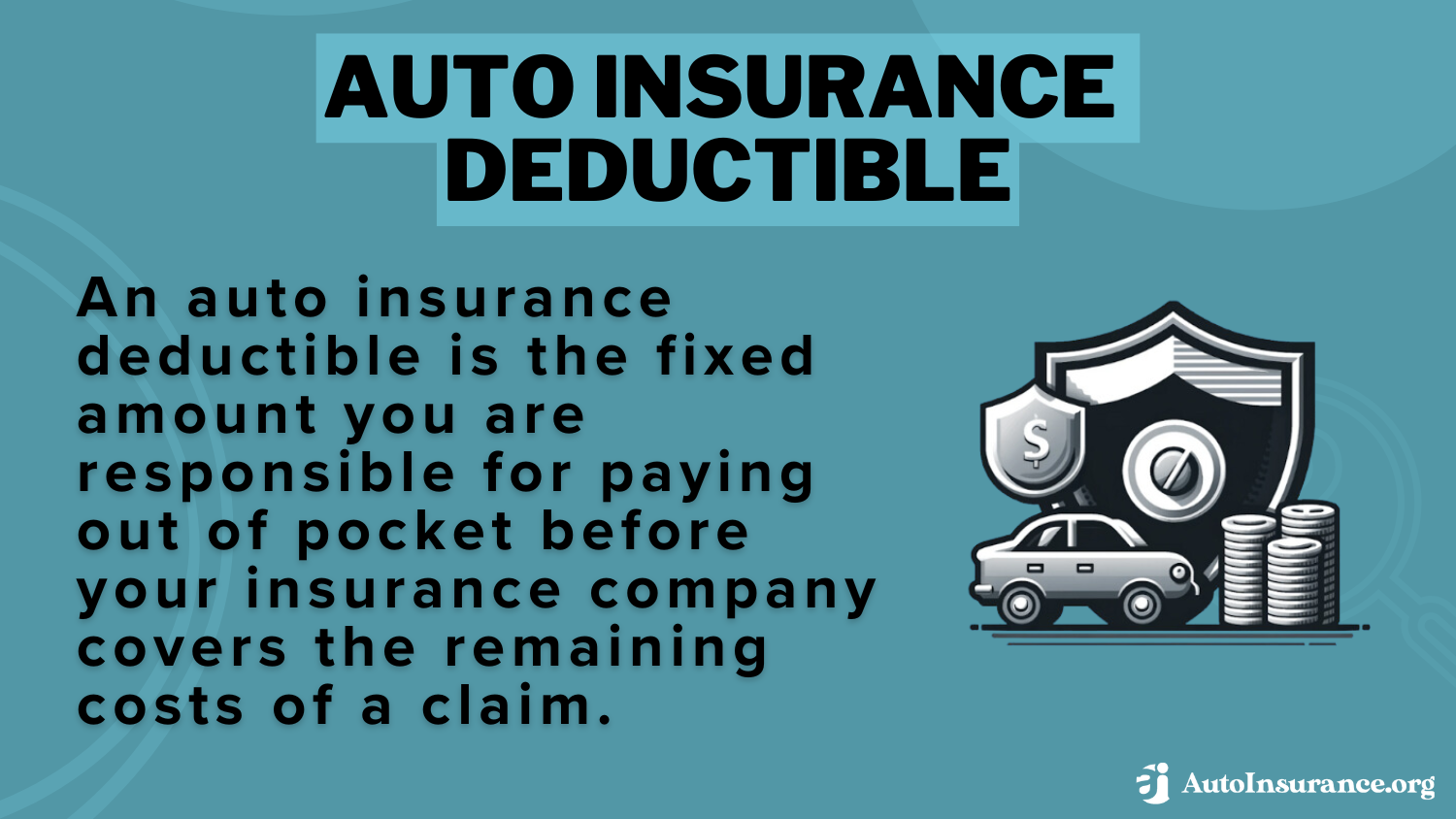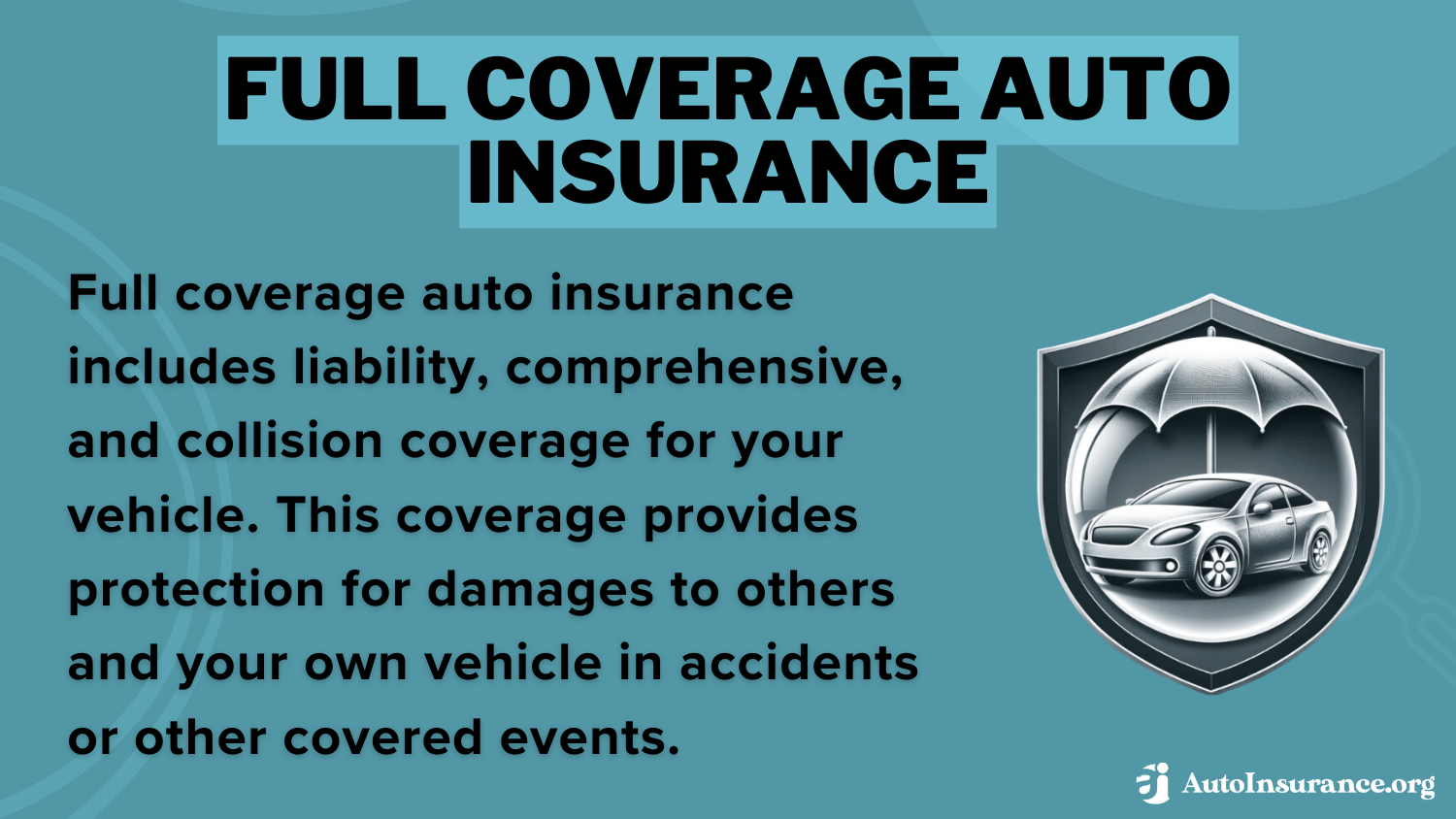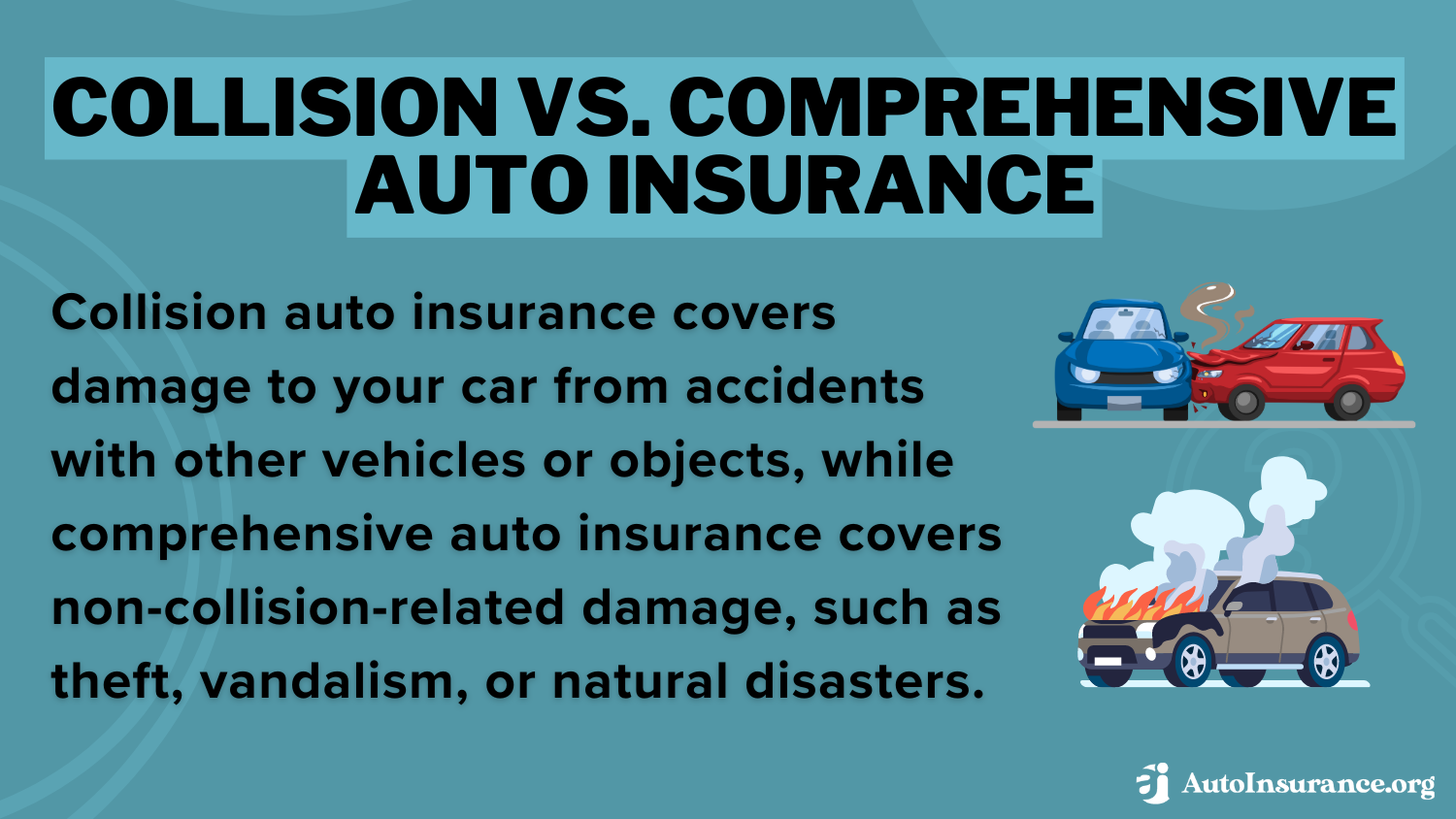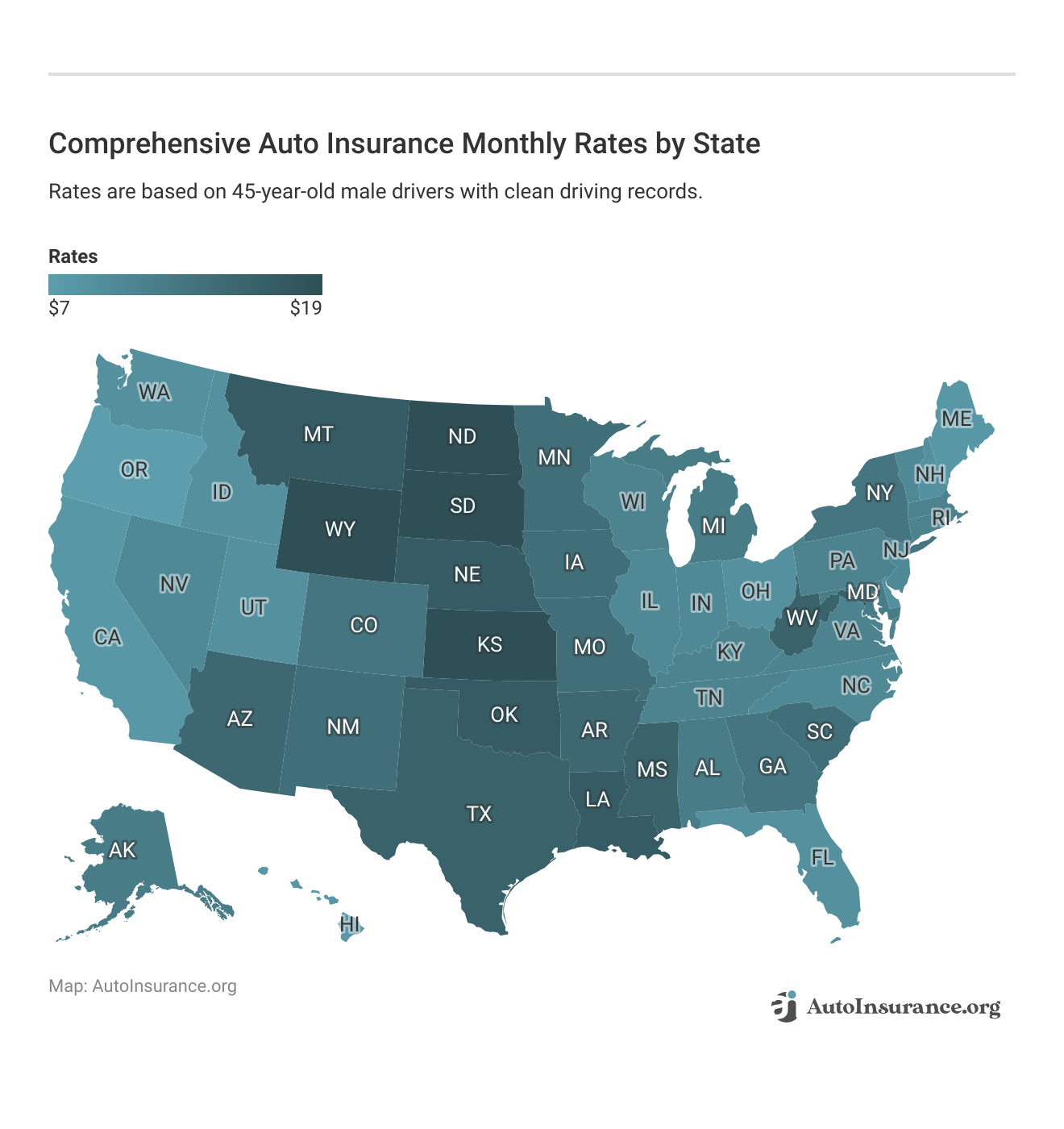Comprehensive Auto Insurance Defined in 2025 (Everything You Need to Know)
Comprehensive auto insurance starts at $7 per month. There are many benefits of comprehensive auto insurance, including glass coverage and protection from animal damage, weather, or theft. You can learn more about the definition of comprehensive auto insurance below and compare average costs for cheap coverage.
Free Car Insurance Comparison
Compare Quotes From Top Companies and Save
Secured with SHA-256 Encryption
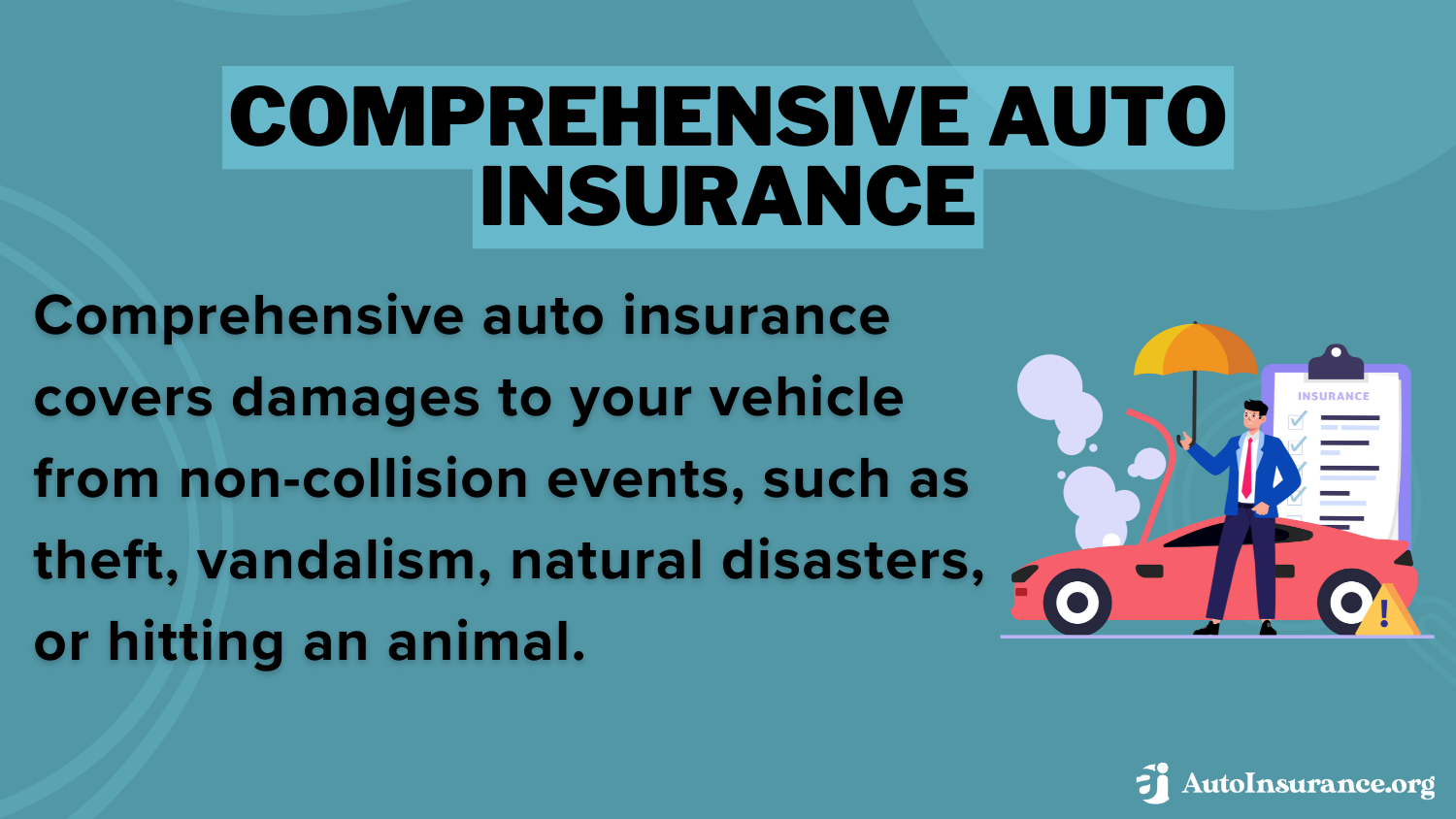
Joel Ohman
Executive Chairman
Joel Ohman is the CEO of a private equity-backed digital media company. He is a published author, angel investor, and serial entrepreneur who has a passion for creating new things, from books to businesses. He has previously served as the founder and resident CFP® of a national insurance agency, Real Time Health Quotes. He has an MBA from the University of South Florida. Joel has been mentione...
Executive Chairman
UPDATED: Jul 3, 2025
It’s all about you. We want to help you make the right coverage choices.
Advertiser Disclosure: We strive to help you make confident auto insurance decisions. Comparison shopping should be easy. We are not affiliated with any one auto insurance provider and cannot guarantee quotes from any single provider. Our partnerships don’t influence our content. Our opinions are our own. To compare quotes from many different companies please enter your ZIP code on this page to use the free quote tool. The more quotes you compare, the more chances to save.
Editorial Guidelines: We are a free online resource for anyone interested in learning more about auto insurance. Our goal is to be an objective, third-party resource for everything auto insurance related. We update our site regularly, and all content is reviewed by auto insurance experts.
UPDATED: Jul 3, 2025
It’s all about you. We want to help you make the right coverage choices.
Advertiser Disclosure: We strive to help you make confident auto insurance decisions. Comparison shopping should be easy. We are not affiliated with any one auto insurance provider and cannot guarantee quotes from any single provider. Our partnerships don’t influence our content. Our opinions are our own. To compare quotes from many different companies please enter your ZIP code on this page to use the free quote tool. The more quotes you compare, the more chances to save.
On This Page
What is comprehensive auto insurance? Comprehensive car insurance from the best auto insurance companies protects your car from non-collision damage, from hitting a deer to hail damage, by paying for repairs or your totaled car’s value.
Minimum state auto insurance requirements don’t include comprehensive coverage, but your lender will require it if you have a leased car. The good news is that comprehensive auto insurance rates are usually very cheap, with prices starting at an average of $7 per month.
- Comprehensive auto insurance covers several events outside of a driver’s control
- Lenders require comprehensive car insurance if a driver has a leased car
- On average, comprehensive auto insurance costs $12 monthly in the U.S.
If you’re still wondering, “What is covered under comprehensive auto insurance?” keep reading to learn the comprehensive auto insurance definition, benefits of the coverage, and average comprehensive auto insurance costs. Enter your ZIP code into our free quote tool above to instantly get cheap coverage from the best comprehensive auto insurance companies in your area.
What Comprehensive Auto Insurance Covers
What does comprehensive auto insurance cover? Most comprehensive insurance definitions are simple: various non-collision events are covered under comprehensive car insurance, meaning any incidents not caused by a car wreck. Certain events covered by auto insurance comprehensive coverage include:
- Animal Collisions
- Falling Objects
- Fire and Explosions
- Vandalism and Theft
- Weather Extremes
What does comprehensive mean on car insurance? Some of the incidents covered under the comprehensive auto insurance coverage definition weather category include hail, lightning, floods, and heavy winds. However, in some states, it may not be enough to have comprehensive insurance, meaning you may need fire or flood insurance separately to be fully covered.
If you’re left wondering, “What does comprehensive insurance cover?” after a rock hits your windshield, you’ll need to check with your provider. Most require glass coverage with your comprehensive auto insurance to fully replace your windshield if it gets damaged.
Read More: Does car insurance cover windshield damage or replacement?
Comprehensive Insurance Cost
How much is comprehensive car insurance? Comprehensive car coverage costs around $12 monthly. Take a look at the table below to compare comprehensive auto insurance costs by U.S. state:
Of course, there are various factors that affect auto insurance rates for comprehensive coverage, such as location, driving record, vehicle type, and other factors. Some of the most expensive states for comprehensive car insurance include North Dakota, South Dakota, and Wyoming.
On the other hand, states with a cheap comprehensive insurance price include Oregon, Maine, and California.
Cost can be a huge deterrent for some drivers when choosing coverages. The best way to get the cheapest comprehensive auto insurance rates for you is to get quotes from a few different companies in your area.
Free Auto Insurance Comparison
Enter your ZIP code below to view companies that have cheap auto insurance rates.
Secured with SHA-256 Encryption
What Comprehensive Auto Insurance Doesn’t Cover
When it comes to car insurance, comprehensive coverage handles a lot. However, it doesn’t cover everything. Some insurance companies may not include fire and flood damage in their auto insurance comprehensive coverage definition if your area is prone to fires and floods. Comprehensive insurance also won’t cover any of the following:
- Damages or Injuries From an At-Fault Accident: Liability auto insurance pays for others’ injuries or property damage if you cause an accident. The question, “What is comprehensive car insurance?” never involves paying for other people’s cars.
- Car Damage From a Collision: Wondering what’s comprehensive insurance compared to collision? If you cause an accident and have collision auto insurance, collision covers it. If the accident wasn’t your fault, the other driver’s liability would cover it. Learn more about collision vs. comprehensive auto insurance coverage.
- Injuries to You or Your Passengers: Comprehensive insurance doesn’t cover injuries to drivers or passengers from an accident.
Not everything is covered under comprehensive claims for auto insurance, as your other insurance coverages will take care of the abovementioned incidents.
Deductibles for Comprehensive Car Insurance Explained
Most comprehensive coverages will have a comprehensive auto insurance deductible unless drivers pay for the more expensive plans with no deductible. Generally, comprehensive deductibles range from $500 to $2,000.
When you choose a comprehensive auto insurance deductible amount, you agree to pay that amount in a covered claim. So, if you have a $500 deductible, you must put $500 toward repairs, and your insurance will cover the remainder of the bill.
If your car gets totaled under a comprehensive covered event, then insurance will pay for the car’s value minus the comprehensive deductible. So if your car is currently worth $10,000, but you have a $1,000 deductible, insurance will pay you $9,000.
This may lead you to wonder, “What is a good comprehensive deductible?” The best comprehensive deductible for you depends on your financial situation and risk tolerance, but common deductible amounts range from $250 to $1,000.
While raising your deductible will lower the cost of your comprehensive insurance rates, you should always ensure you can afford your deductible. If you can’t pay the comprehensive insurance policy deductible to get your car repaired, you should lower the deductible amount even if it raises your rates slightly.
Full Coverage vs. Comprehensive and Collision
What does comprehensive mean in auto insurance vs. full coverage? The comprehensive car insurance definition often gets confused with full coverage auto insurance. However, they’re not the same thing. Comprehensive insurance is a specific coverage, whereas full insurance coverage refers to several types of auto insurance.
Typically, full coverage consists of liability insurance, comprehensive car insurance, and collision coverage. Collision auto insurance helps pay for car damages following a collision.
You may be wondering when to drop collision insurance, given its high cost. We recommend you consider dropping your collision policy once annual premiums exceed 10% of your car’s value, or if you have enough saved to pay for repair or replacement.
Other coverages that often come with a full coverage policy include medical payments, personal injury protection auto insurance, and uninsured/underinsured motorist.
Free Auto Insurance Comparison
Enter your ZIP code below to view companies that have cheap auto insurance rates.
Secured with SHA-256 Encryption
Deciding if You Need Comprehensive Car Insurance Coverage
If you’re having trouble deciding whether the benefits of comprehensive auto insurance outweigh the cost, you should consider a few things.
One major thing to keep in mind is costs. Comprehensive coverage offers valuable protection, but it will increase the cost of your monthly premiums. While it's usually affordable, drivers in areas with high crime rates or natural disasters may see high prices.Scott W. Johnson Licensed Insurance Agent
Shop around for comprehensive auto insurance quotes from the best auto insurance companies if any of the following apply to your vehicle:
- Financed: Your lender will require you to carry comprehensive insurance to protect their assets. Remember, it’s usually cheaper to purchase your own personal comprehensive insurance than to buy it through the lender.
- New or Expensive: You should carry comprehensive insurance if you would face heavy financial losses if your car were damaged or totaled.
However, there are also situations where you can skip buying comprehensive car insurance. The best way to determine if you don’t need comprehensive coverage is to calculate your car’s cash value and consider it against your comprehensive auto insurance deductible and monthly payments.
For example, if your car is so old that it is only worth $2,000, and your comprehensive auto insurance deductible is $1,500, it’s not worth keeping comprehensive insurance. As such, your monthly payments would soon equal or surpass the small payout that insurance would give you after an accident. In some cases, you may even end up paying more for insurance over time compared to your claim amount.
How to Buy Comprehensive Auto Insurance by Itself
For the most part, you can’t buy a policy with just comprehensive insurance. Most insurance companies will require that you also purchase collision insurance if you want comprehensive coverage.
Collision insurance is a valuable addition to most policies. It pays for damage to your vehicle after a collision, even if you’re at fault. It also covers collisions with:
- Potholes
- Stationary Objects
- Hit-and-Runs
- Parking Lot Objects
As you can see, collision insurance offers excellent coverage for your vehicle. Most insurance companies sell these coverages together and won’t sell comprehensive without collision.
One exception to this rule is if you plan on keeping your car parked safely in a garage. If that’s the case, your insurance company may sell you comprehensive without collision. That way, your car will be protected from damage that might happen while parked, like a tree falling through your garage in a storm.
Find the Best Comprehensive Auto Insurance Today
What is comprehensive insurance? Now that you know the auto insurance comprehensive definition, you know there are various benefits to comprehensive car insurance, ranging from glass coverage to protection against animal collisions, weather damage, and more. However, drivers with older cars that aren’t worth much can skip comprehensive coverage without financial risk and pick from different types of auto insurance.
Insurance covers your car in the event of an accident, but what about vandalism or bad weather?😱That's where comprehensive coverage comes in! At https://t.co/27f1xf131D, we want to help you decide if this coverage add-on is worth it! Learn more here👉: https://t.co/ii0sdamcEp pic.twitter.com/BSMBfTAaIx
— AutoInsurance.org (@AutoInsurance) May 31, 2023
If you have a newer or leased car and want to protect it, you should compare affordable comprehensive auto insurance costs by getting quotes from several companies. Simply enter your ZIP code into our free quote tool below to instantly compare rates from the top providers near you.
Frequently Asked Questions
What is the comprehensive coverage definition?
You may be wondering, “What is auto comprehensive insurance?” Comprehensive automobile coverage refers to protection for your vehicle from non-collision events, such as theft, animal damage, weather, and vandalism. It either pays for repairs or the value to replace your vehicle minus your comprehensive auto insurance deductible.
What does a comprehensive policy cover?
Comprehensive insurance covers the following events:
- Weather Damage
- Falling Objects
- Vandalism, Theft, and Fire
- Animal Contact
- Civil Disturbances
Ready to get complete coverage for these situations? Enter your ZIP code into our free quote comparison tool below to shop for prices from the top comprehensive providers near you.
Is comprehensive insurance worth it?
Whether comprehensive insurance for auto owners is worth it depends on their situation and vehicle. If your car is new or has a high market value, it’s generally worth getting comprehensive driving insurance. Learning how to get multiple auto insurance quotes can help you find affordable comprehensive coverage.
Do drivers need comprehensive auto insurance on old cars?
Drivers with older vehicles commonly ask, “Do I need comprehensive insurance on an old car?” You don’t need comprehensive auto insurance if you don’t have a car loan or lease. It’s best to skip comprehensive coverage if your old car isn’t worth much, and you wouldn’t get much money from a comprehensive auto insurance claim after the cost of your deductible.
Is it worth having full coverage on an old car?
You may wonder, “Is comprehensive full coverage worth it for an older vehicle?” Whether having full coverage on a car is worth it depends on various factors, such as the car’s value, your financial situation, and risk tolerance.
Will comprehensive auto insurance cover theft?
You may be wondering, “Does comprehensive cover theft?” Yes, comprehensive insurance will pay your car’s value minus your chosen comprehensive auto insurance deductible if it gets stolen.
How much is comprehensive insurance?
A top question readers ask is, “How much does comprehensive auto insurance cost?” The average comprehensive insurance price per month is $12, but it varies by provider and driving profile. However, you should learn how to evaluate auto insurance quotes will help you find the lowest rates.
How much comprehensive auto insurance should I carry?
Comprehensive auto insurance isn’t like liability auto insurance, where you choose the amount of coverage you want. Instead, you choose your comprehensive auto insurance deductible. Minus your deductible, comprehensive insurance will pay for repairs or pay the value of your car if it gets totaled.
Can I just have comprehensive auto insurance?
No, you’ll also need to carry your state’s required minimum liability insurance. Some insurance companies also only sell comprehensive insurance as a package deal with collision insurance, so you may have to purchase both types of auto insurance to have comprehensive coverage.
Is comprehensive auto insurance mandatory?
No state law requires comprehensive auto insurance. However, if you have a car loan or lease, your lender or leasing company may require you to carry comprehensive coverage until you fulfill your financial obligations.
How does the deductible work for comprehensive insurance?
A deductible is the amount you agree to pay out of pocket before your insurance coverage kicks in. With comprehensive auto insurance, you choose a deductible amount (e.g., $500 or $1,000) when purchasing the policy. When you file a claim, you’re responsible for paying the deductible, and the insurance company covers the remaining cost up to the policy’s limits.
Is there a difference between my comprehensive vs. collision deductible? No, your comprehensive and collision car insurance deductibles are the same since you must buy both coverages together.
Can I lower the deductible for comprehensive coverage?
Yes, in most cases, you can adjust the deductible for your comprehensive auto insurance.
This might lead you to ask, “Is it better to have a $500 deductible or $1,000?” The best deductible amount to choose depends on your financial situation. However, choosing a higher comprehensive auto insurance deductible usually results in lower premiums, while selecting a lower deductible will increase your premiums. Picking a reasonable deductible for your auto insurance is an important part of finding affordable coverage.
Will comprehensive insurance cover a cracked windshield?
Yes, comprehensive auto insurance glass coverage pays to replace windshields damaged by flying debris, rocks, or similar incidents. Some policies even offer additional coverage that waives the comprehensive auto insurance deductible for windshield repairs.
Does comprehensive insurance cover rental cars?
Comprehensive auto insurance generally doesn’t cover rental cars. However, if you have rental car reimbursement coverage on your policy, it may help pay for a rental vehicle if your car was stolen or is in the repair shop due to a covered incident.
Is it better to have collision or comprehensive coverage?
Whether you need comprehensive vs. collision insurance depends on your individual needs. However, most providers require you to purchase both coverages together, meaning you typically can’t buy a comprehensive and collision policy separately.
Is comprehensive insurance full coverage?
No, while comprehensive insurance is a part of full coverage car insurance, it doesn’t provide complete protection by itself. Generally, full coverage offers broader protection, including liability and collision insurance.
Who has the best comprehensive coverage: State Farm or Geico?
State Farm is our top pick for best comprehensive auto insurance company, though Geico comprehensive coverage comes in second and Progressive comprehensive coverage comes in third.
Does comprehensive cover engine failure?
Generally, engine failure won’t be covered under comprehensive coverage unless it results from a covered incident, such as a fire. However, mechanical breakdown and wear and tear aren’t covered.
Why is comprehensive insurance so expensive?
You may see higher comprehensive rates if you live in an area with lots of theft, vandalism, or weather issues.
Does comprehensive insurance cover pothole damage?
No, comprehensive coverage generally won’t pay for pothole damage. You’ll usually file a claim under your collision coverage to pay for vehicle damage from a pothole.
Free Auto Insurance Comparison
Enter your ZIP code below to view companies that have cheap auto insurance rates.
Secured with SHA-256 Encryption
Joel Ohman
Executive Chairman
Joel Ohman is the CEO of a private equity-backed digital media company. He is a published author, angel investor, and serial entrepreneur who has a passion for creating new things, from books to businesses. He has previously served as the founder and resident CFP® of a national insurance agency, Real Time Health Quotes. He has an MBA from the University of South Florida. Joel has been mentione...
Executive Chairman
Editorial Guidelines: We are a free online resource for anyone interested in learning more about auto insurance. Our goal is to be an objective, third-party resource for everything auto insurance related. We update our site regularly, and all content is reviewed by auto insurance experts.

